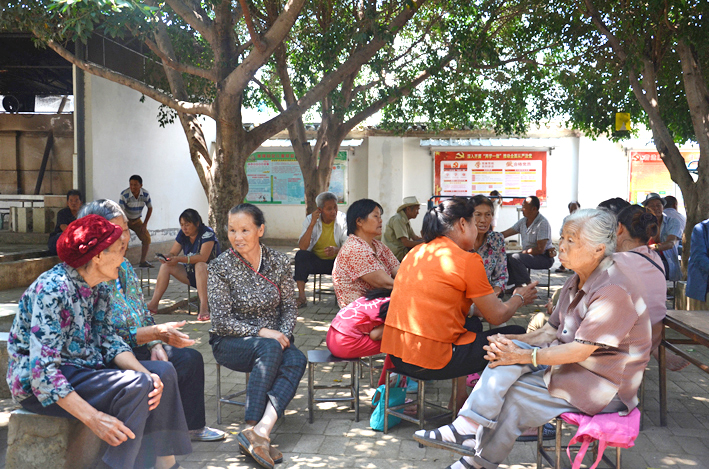New models bring vitality to villager autonomy

Villagers chat pleasantly while enjoying cool air in front of the Center for Cultural Activities at Baizhuangmao Village in Binchuan County, Yunnan Province. Villager autonomy has played a vital role in building the beautiful village.
In recent years, there have been new trends and challenges in the development of rural community construction and village-level governance. On Dec. 9, the 30th Anniversary of the Organization Law of Village Committees and seminar on promoting villager autonomy hosted by the Institute of China Rural Studies (ICRS) and Institute for Advanced Political Study of Central China Normal University was held at Central China Normal University.
Cheng Tongshun, deputy dean of the Zhou Enlai School of Government at Nankai University, said the achievements and significance of villager autonomy can be seen in the following aspects. First, the system of villager autonomy has changed the governance structure that has ruled the countryside for thousands of years. Its operational model has changed from “from central to local” to “from local to central.” Second, the practice of villager autonomy has fostered an awareness of democracy and enthusiasm for political participation among farmers. It has enhanced their political acknowledgement and capacity to participate in democratic processes while promoting the institutionalization and legislation of rural politics. Third, villager autonomy has enabled the vast majority of farmers to effectively supervise rural cadres, improving the political and professional ability of rural officials and ensuring that state policies are thoroughly implemented in the countryside. Fourth, in the practice of villager autonomy, many new forms of democracy have greatly enriched the practice and theory of socialist democracy in China.
However, in light of the great mobility of villagers and the openness of rural communities, there are obvious problems with the current system of villager autonomy. Lu Fu, a professor from the School of Politics and Sociology at Hangzhou Normal University, said the most typical problem is that migrant farmers have failed to fully engage in public management activities and democratic political life in the communities where they reside. Hence their democratic rights granted by the law are hardly effective. Also, the institutions of public power where the migrant workers currently live lack the authority to administrate them because they are in the charge of the organizations where their hukou have been registered. But these organizations are also not able to manage these migrant workers since they are outside of their villages. These transient villagers remained in a state of being unserved.
Villager autonomy is a system and an activity rooted in the practice of the masses. It demands top-level social soil for practice. Deng Dacai, head of the ICRS, explained that economic interests, especially property rights, are the economic basis for effective villager autonomy. Geographical proximity is the external condition while cultural connections and moderate scale are the internal requirements of the autonomy system.
Xu Yong, a professor from the ICRS, said villager autonomy does not necessarily focus on the village committee but should have more autonomy models. In the development of villager autonomy, in addition to “village autonomy plus group autonomy,” there are also multi-level forms of autonomy, such as “community autonomy plus villager autonomy.” This pattern of governance determines the future development of villager autonomy.
